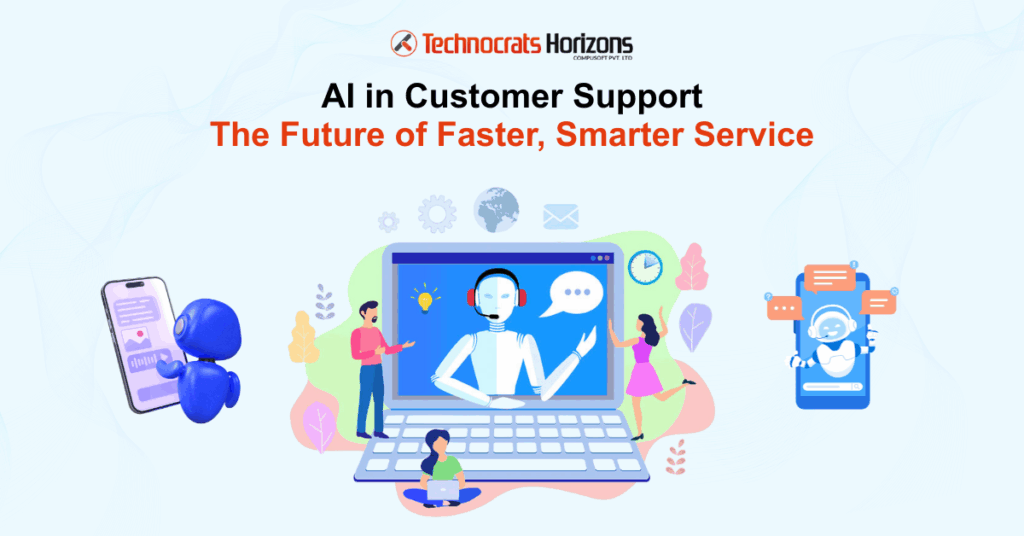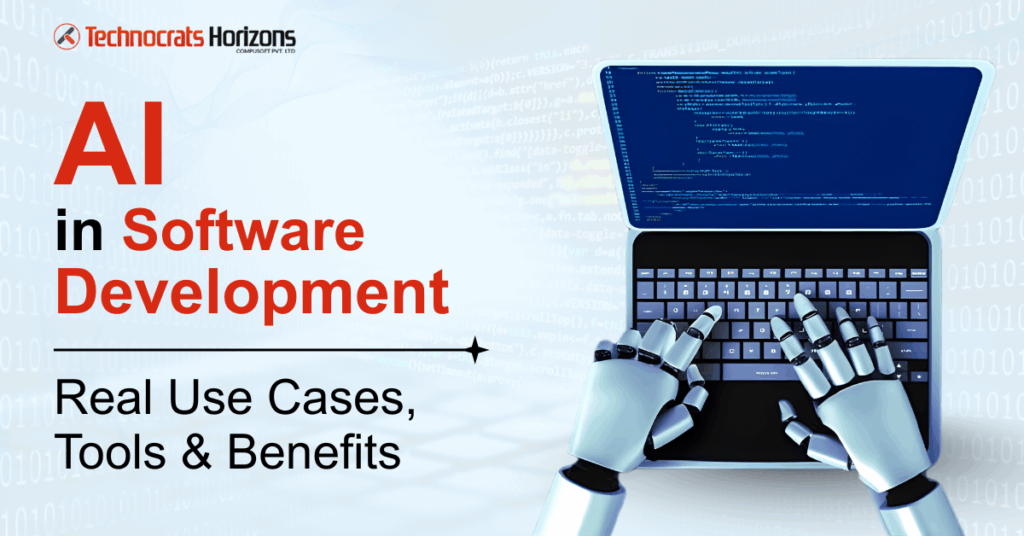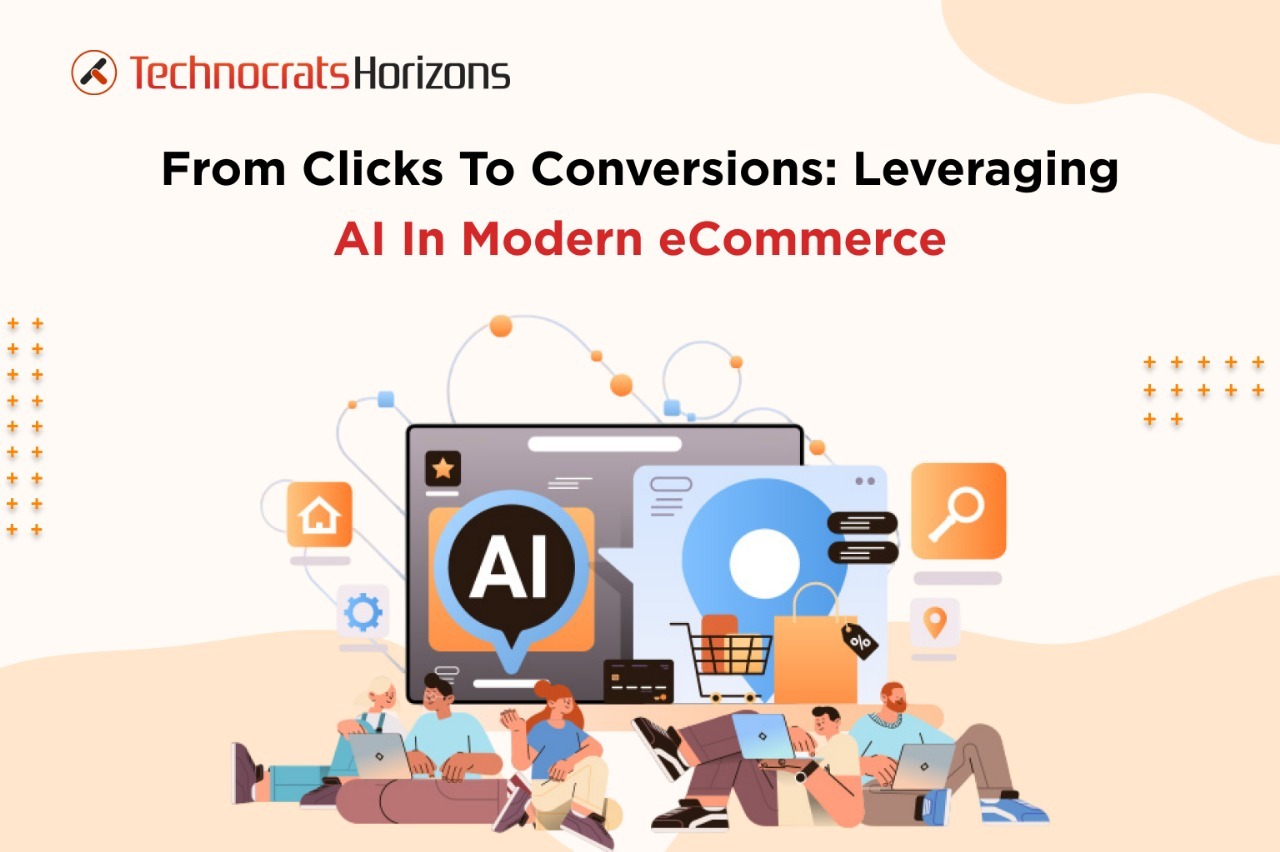The eCommerce landscape is booming but simultaneously getting competitive. Focusing on attracting visitors to the online store is not the only motive of a brand.
The success truly lies in converting those visitors into paying customers, i.e., conversion. Traditional marketing strategies prevail, but the advent of Artificial Intelligence (AI) has become a game-changer by presenting efficient ways for conversion optimization in e-commerce.
This is why the AI-driven eCommerce market is expected to grow to $64.03 billion in 2034. Want to know how AI can influence modern eCommerce? This blog is the answer. Here, you will discover various ways in which AI revolutionizes the eCommerce landscape, from clicks to conversions.
Advantages of AI in Modern eCommerce
AI brings significant transformation in modern eCommerce by making the overall shopping experience more efficient, personalized, and intuitive. From product discovery to sales, it helps businesses transform clicks into loyal customers. Let’s have a brief on the key benefits of AI in modern eCommerce.
- With the personalized product recommendations strategy, AI technology inspects the browsing patterns and purchase behaviour of customers. Accordingly, it suggests relevant products to boost engagement and ultimately sales.
- Virtual assistants and chatbots are dedicated to providing 24/7 customer support. They promptly handle customer queries to enhance the response time and free up human resources.
- AI data analytics analyze market trends and the corresponding impact on customer behaviour. With this data, these algorithms adjust prices in real-time to help businesses boost profits and stay competitive.
- AI tools are available to automate content creation for product listings and marketing campaigns. These tools generate SEO-friendly ads and descriptions to save the time and effort of organizations.
Ways in Which AI Influences Modern eCommerce
AI adopts various ways to drive positive changes in modern eCommerce, so let’s explore these ways.
1) Facilitates a Personalized Shopping Experience
AI can recommend relevant products that align with individuals’ needs and preferences. The corresponding algorithms analyze customers’ browsing patterns and purchase histories to provide such recommendations. As a result, customers feel as if their shopping experience is tailored specifically for them. This eventually boosts customer engagement and helps a business drive more sales.
35% of Amazon sales are positively influenced by AI-driven product recommendations. A huge number of retailers use AI for defining prices, targeting content personalization, and reporting revenue growth.
2) Helps Boost Sales
As per recent research, 72 % of company executives widely expect their businesses to adopt AI automation by the end of 2025.
An increasing number of businesses today use AI-powered solutions to inspect customer data.
Subsequently, they can recognize products that appeal to specific customers and thus promote them accordingly. It implies a more targeted approach towards product recommendations, driving sales and profits.
By analyzing customer behavior and past purchases, you can recommend products aligning with customers’ needs and preferences, which allows them to likely make a purchase.
Apart from conversion, eCommerce businesses can predict customer churn using AI. For example, using AI in businesses can classify customers who haven’t made a purchase for a long time and send personalized messages to retain them.
To help businesses boost sales, AI tools can predict the best time and message format to target for each user. Hence, they make marketing efforts more effective.
Power Your eStore with AI
3) Enhances Customer Engagement
The secret of business success lies in customer loyalty.
Businesses can use chatbots to respond to customer queries in real-time and thus help in strengthening formal relations with customers. It eventually leads to happier customers, who are more likely to return and refer the business to others.
Many organizations today use AI-driven virtual assistants and chatbots to enhance their customer service. With these solutions, they strive to provide round-the-clock support, provide recommendations, and even help in transactions.
This is why 74% of consumers prefer directly approaching chatbots for query support than human support executives. The AI chatbots can instantly resolve customer queries and guide shoppers to checkout, decreasing cart abandonment.
AI chatbots for customer service deliver valuable and more natural responses. As a result, customer engagement is enhanced and dependency on human agents reduces.
4) Enables Inventory Optimization
The current eCommerce landscape perceives tough competition, where one of the key highlights is pricing. Pricing must be dynamic for a business to stay competitive in the market.
AI tools inspect real-time data (such as demand trends, level of inventory, competitor pricing, etc.) to automatically adapt prices and thus help businesses with conversion and profit.
AI-powered predictive analytics assists businesses in accurately managing stock levels to curtail issues like out-of-stock and overstock. This is possible by forecasting demand trends after analyzing market shifts, promotions, and seasonality with AI-driven data analytics.
A digital commerce solution that integrates AI tools capable of demand forecasting can ensure that inventory planning and pricing stay agile and data-driven. As a result, such a solution benefits businesses with consistent financial performance.
5) Implements Intent-Driven Ad Strategy
AI algorithms can identify browsing patterns and forecast future behavior. In the context of marketing, it means identifying high-intent users, i.e., analyzing customers’ browsing behavior to find visitors who are most likely to purchase.
With this analysis, AI tools can display tailored ads on social media and other online platforms. Alternatively, these tools can send personalized emails targeted at those users who showed interest in products.
Ways in which AI tools identify customers’ interest can be –identifying customers who viewed a product, and customers who abandoned a cart but haven’t converted.
AI helps boost conversions in the following ways:
- AI solutions can target high-conversion audiences and thus help businesses optimize marketing budgets. As a result, businesses can determine the maximum probability of conversion and thus boost return on ad spend.
- They provide timely, relevant reminders to re-engage distracted visitors and thus guide them back on their purchase journey.
- AI-powered solutions deliver personalized messages that align with a customer’s interests far better than generic ads and emails. Messages tailored to a customer’s specific requirement can help boost engagement and eventually aid businesses in driving sales.
Related: https://technocratshorizons.com/blog/ai-for-business-automation/
6) Automates marketing campaign
One of the key elements behind business success in the eCommerce landscape is a marketing campaign. AI-powered tools enable eCommerce business owners to run efficient marketing campaigns.
With these campaigns, businesses can automate iterative tasks, categorize customer lists, and also optimize ad expenditure.
For example, AI can categorize customers into several groups based on their purchase history, browsing pattern, or demographic data.
Subsequently, a business can target specific groups based on messages customized to their needs. Hence, the chances of conversion increase. Rather than sending a generic email to all customers, using AI can let businesses send personalized offers to engage with them.
AI also helps in optimizing campaigns by providing real-time analytics of the performance data. It then automatically adjusts targeting parameters or bids to obtain improved results. So, businesses can leverage AI to get optimal ROI on their marketing budget.
Using AI automation allows organizations to make their marketing campaigns data-driven and result-focused so that they can optimally use their resources.
Upgrade to AI-Driven eCommerce
Challenges to Tackle for Leveraging AI in eCommerce
AI in modern eCommerce does provide a plethora of benefits, but it encounters some crucial challenges as outlined below.
1) Concerns of Data Privacy
The growing use of AI solutions raises concerns regarding data security and privacy. eCommerce businesses must ascertain that the data gathered from customers stays safe and is managed responsibly with their consent.
They must be transparent as well on how the data is being utilized and secured. When processing sensitive customer information, AI tools raise two key concerns.
The first is complying with regulations like CCPA and GDPR. Another concern is the risk of data breaches and abuse.
2) Bias Risks and Ethical Concerns
One of the noteworthy challenges in incorporating AI models in modern eCommerce is that they can accidentally strengthen biases in training data. Subsequently, it leads to partial product recommendations, pricing inequalities, or prohibiting certain customer segments.
Companies can mitigate this challenge by:
- Regularly auditing algorithms
- Conducting fairness checks
- Branching out training datasets
The urge to mitigate these challenges suggests that ethical AI governance is now becoming quite essential.
3) Poor Data Quality
AI solutions can deliver the best possible results if the input is structured, clean, and comprehensive data.
Many eCommerce platforms work based on fragmented datasets diversified across ERPs, CRMs, and other marketing tools. The absence of integration results in inefficient model performance and inconsistent insights.
In the absence of real-time access to comprehensive data, AI systems find difficulty in tailoring to customers’ requirements or forecasting demands accurately. Hence, a set of robust frameworks is essential to get the optimum output of an AI system.
4) Expensive Implementation
The adoption of an AI system demands upfront investments in hardware and software.
Also, organizations need to invest in employee training to make sure they easily adapt to novel features and upgrades. These costs can be costly for small and mid-sized businesses.
Businesses can begin small with test projects to check results before expanding. Also, cloud-based tools make it simpler to handle costs because they help provide flexible pricing.
5) Lack of human oversight
AI solutions can automate several routine tasks, but they can’t replace human judgment and intelligence.
eCommerce businesses must keep humans involved to ascertain that AI makes accurate and fair choices. It is essential to review AI insights and determine the actions to take.
Boost Sales with Smart AI Tools
Final Words
It may be challenging for businesses to boost sales and drive customer engagement. Efficiently and smartly leveraging AI can provide a plethora of benefits that optimize the process from clicks to conversion.
By employing the discussed AI-powered techniques, businesses can convert more visitors into loyal customers, drive more sales, and eventually become more credible in the market.
Thinking of implementing AI for your eCommerce business? Technocrats Horizons becomes your effective partner. Our eCommerce development services are powered by leading AI technology that helps you streamline every complex process with human intelligence.
Contact us now to lead the competitive landscape effectively with an AI-driven eCommerce solution.
AI is the future of technology! Adapt Now!
Get a free consultation to see how our AI experts can transform your business processes.











 Request a
Request a

























